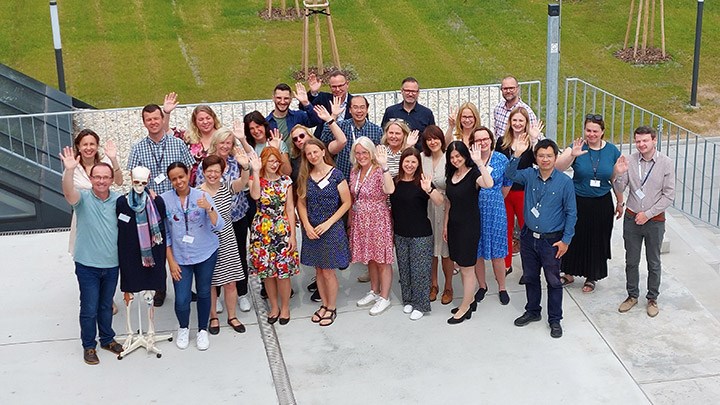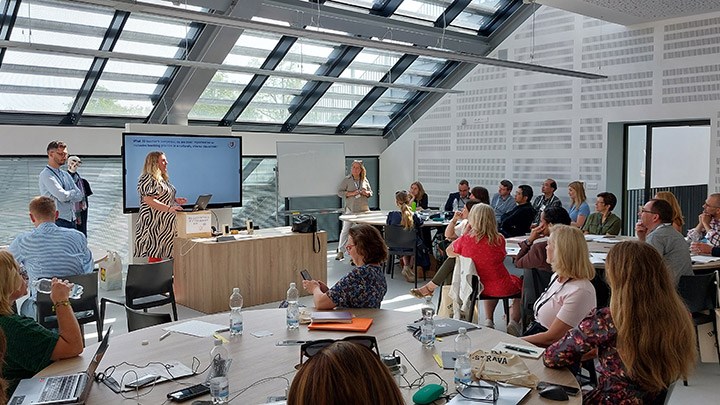International perspectives promote the quality of teaching

In Ostrava. Participants from Örebro University, University of Ostrava and The Hague University of Applied Science work together to develop higher education pedagogy with a focus on internationalisation, diversity and inclusion.
Methods in teaching and learning in higher education that promote internationalisation in the classroom. Örebro University, together with six other universities, is participating in an EU project aimed at developing teaching methods that contribute to internationalisation and benefit from student diversity.
”Thanks to this project, I’ve gained new perspectives on teaching and learning processes in an inclusive environment,” says Stepan Mazur, senior lecturer in statistics at Örebro University.
For nearly two years now, ten teachers from Örebro University have participated in a Professional Learning Community – a network formed with colleagues from the University of Ostrava and The Hague University of Applied Science. Together they are working to develop higher education pedagogy that promotes internationalisation, diversity, and inclusion.
”I believe internationalisation to be an essential tool behind successful pedagogy in higher education,” says Stepan Mazur.
The network is part of the EU-funded programme ”Supporting academics to become international educators through professional learning communities.” A total of six universities in Europe and the United States are participating. Among these, two are partner universities in the NEOLAiA alliance, Ostrava and Jaén.
New perspectives and practical ideas
Since the project began, participants have regularly met digitally to discuss the development of teaching and learning in higher education, focusing on internationalisation. Recently, nearly 40 participants from Örebro University, the University of Ostrava and The Hague University of Applied Science gathered in Ostrava, Czech Republic, to participate in various workshops and activities.
”It’s been a positive experience, discussing and gaining new perspectives on student learning in heterogeneous groups with a high degree of intercultural differences. I’ve also gotten practical ideas on how different learning elements and activities can be designed to contribute to a safe and secure intercultural learning environment that creates better conditions for students’ learning,” says Helen Stockhult, senior lecturer in business administration and one of the organisers of the meeting in Ostrava.
“I’ve gained new perspectives on teaching and learning processes in an inclusive environment. I see this as an important part of my continuing professional development. The rapid development of AI and its impact on higher education are also topics we’ve discussed,” says Stepan Mazur.

Interdisciplinary networking – on campus
Thanks to the network, participants have opportunities to discuss their different perspectives on the intercultural classroom, which has led to the development of their teaching.
In addition, the project has led to participants from Örebro University meeting on several occasions here on campus to discuss these issues and exchange experiences.
”We’ve created a fantastic interdisciplinary network at Örebro University for bringing up these sorts of questions. By getting to know colleagues from other subjects, I’ve gained insight into how work is carried out with internationalisation in other fields. Based on our shared experiences, I can better understand what challenges may arise,” says Helen Stockhult.
An unexplored area
There is a growing need for methods in teaching and learning in higher education that promote internationalisation, which until now has been a relatively unexplored area at Örebro University.
“A motivating force for being part of this project is our identified need for developing higher education teaching and learning linked to internationalisation, diversity and inclusion,” says Ida Andersson-Norrie, international strategy officer at Örebro University.
What feedback have you received from the participants?
”We’ve received a very positive response from our participants from Örebro regarding both meetings with the other universities as well as here on campus. It has already influenced how teachers structure their courses and work with inclusion and diversity in their teaching,” says Ida Andersson-Norrie.
Text: Jasenka Dobric
Photo: Marek Suchanek, Monika Smidlova
Translation: Jerry Gray
The project “Supporting academics to become international educators through professional learning communities” is funded via Erasmus+. The three-year project ends in 2024.
Seven universities are included in the project:
Palacký University Olomouc, Czech Republic (coordinator)
University of Ostrava, Czech Republic (NEOLAiA partner)
University of Jaén, Spain (NEOLAiA partner)
Örebro University, Sweden (NEOLAiA partner)
University of Hradec Králové, Czech Republic
The Hague University of Applied Sciences, The Netherlands
University of Minnesota, USA
